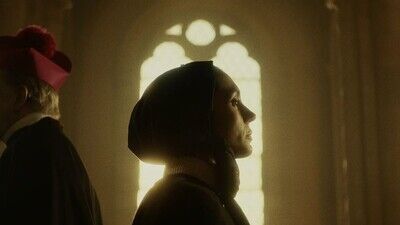How right she is in this impressive (yet overlong) Great Woman biopic, directed by Alejandro Monteverde and written by Rod Barr. In fact, the entire film refreshingly feels like a testament to those unique powers of femininity—when one is constantly dismissed for her gender, undermined and told no, one does grow a few additional physical and emotional muscles away from the prying eyes of men. It’s that fortitude that sets Cabrini in motion in 1889 and brings her over to New York with a group of nuns, all appointed by the Pope Leo XIII (Giancarlo Giannini) in a mission to support the city’s careworn Italian immigrant communities. At that time, NYC—just a couple of decades removed from the “Gangs of New York” era—was ruthlessly hostile towards the Italians, the opening cards tell us. The environment was predictably antagonistic towards women. And helpless children were dying in a city that refused to care for its most vulnerable. So defying the odds (and ignoring her flailing health condition), Francesca gets settled in the slums of Lower Manhattan’s Five Points at once, starting to fight an initially losing battle towards all the powers that neither want her nor her country men, women and children.
Much of the film is structured around her false starts, which in turn gives the audience plenty of opportunities to see the kind of womanly stamina Cabrini talks about in the aforesaid scene with the mayor. While it is sometimes laced with Cabrini’s colorful array of supporters, such as a kindly local priest called Father Morelli (Gaimpiero Judica), a precocious orphan and a prostitute played by Romana Maggiora Vergano, “Cabrini” also can’t escape a repetitive flavor due to these endless ups and downs, across a runtime that begs to be tightened.
Still, along with his cinematographer Gorka Gónez Andreu, Monteverde makes it worth your while in the visuals department. There are countless beautifully conceived compositions and classically grand illumination across “Cabrini” that shoots arrows of lights and shadows through New York’s floor-to-ceiling windows, giving us the kind of middlebrow, big-screen period piece that used to occupy our theater screens regularly just a few decades ago. These days, the likes of “Cabrini” deserve praise simply by virtue of committing to a sumptuous cinematic palette and, well, looking like a movie. One sequence in particular, when a group of kids sings Verdi’s “Va, pensiero” chorus to a famed Italian opera singer in order to beg for his high-profile support in their cause, signals that kind of a movie flavor of yore.

